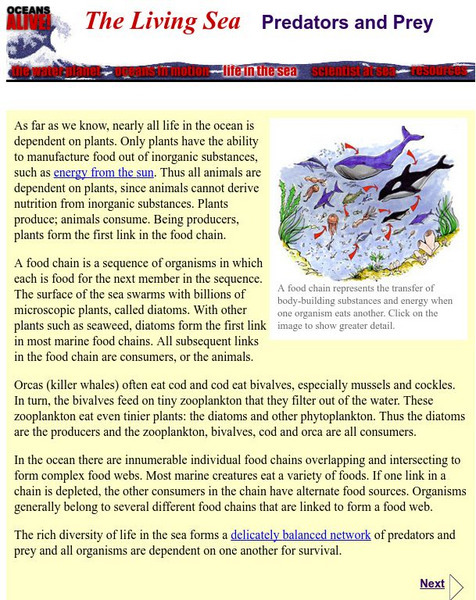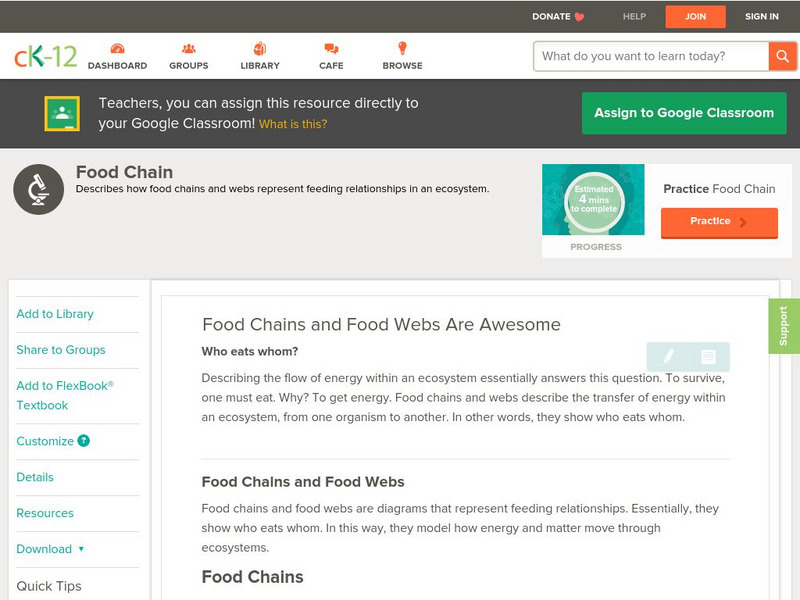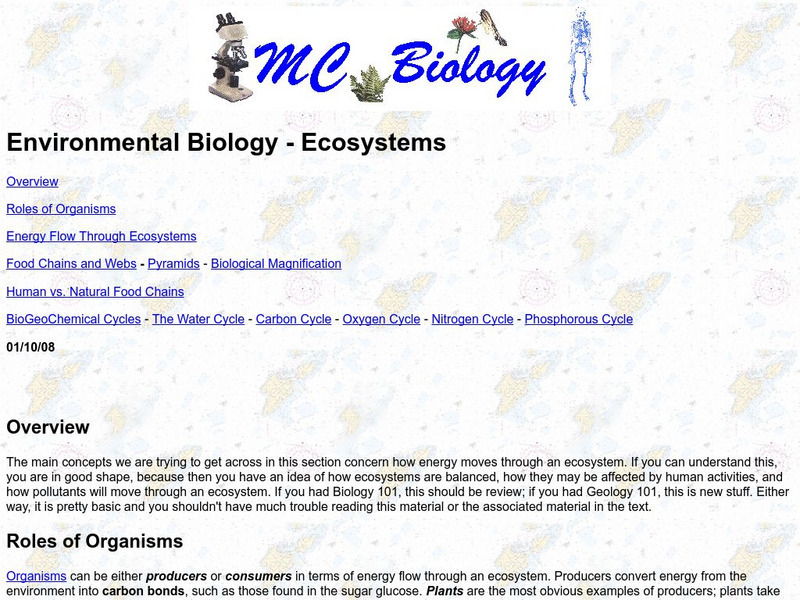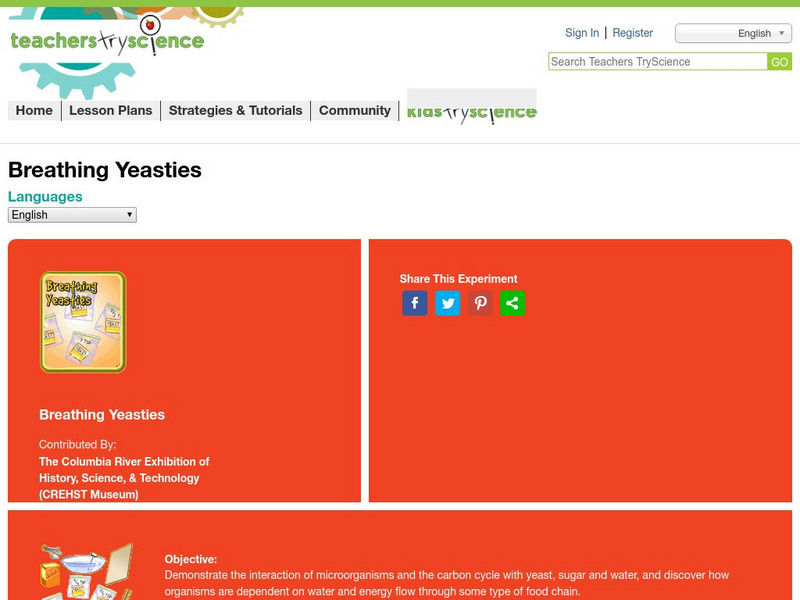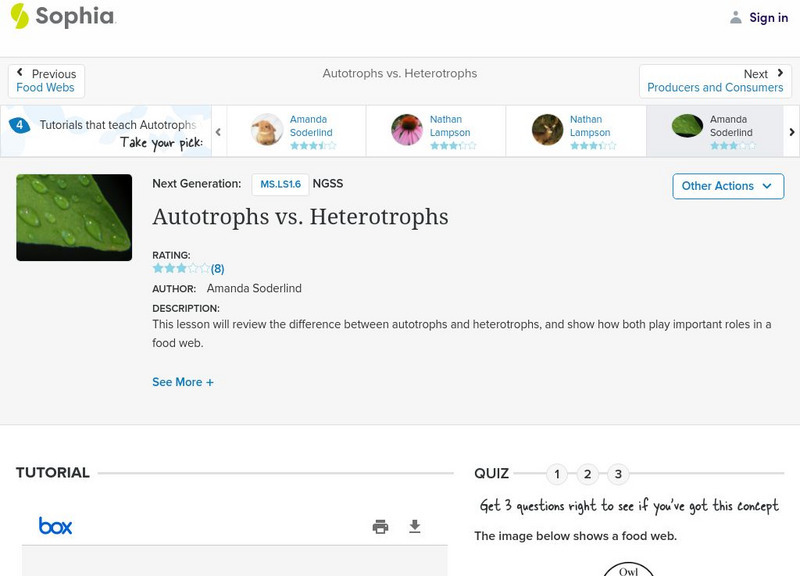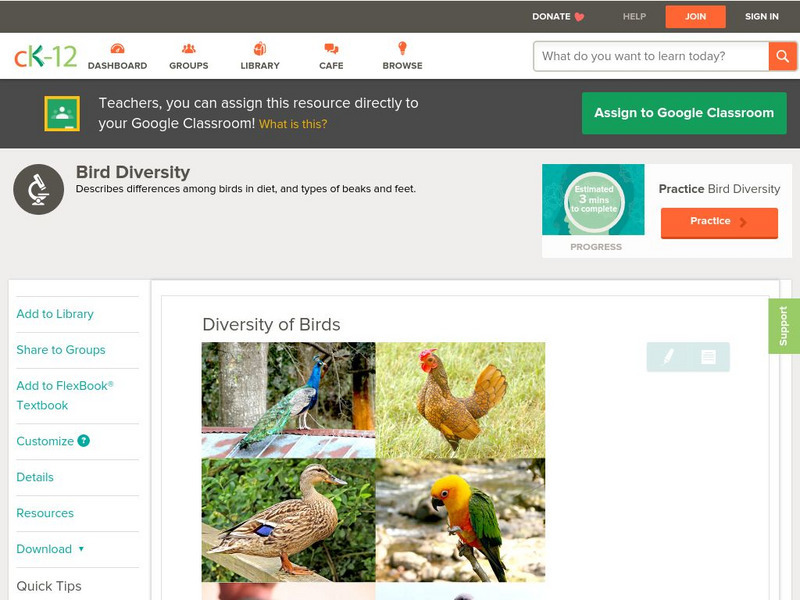Museum of Science
Museum of Science: The Living Sea: Predators and Prey
This Museum of Science page does an excellent job of explaining the importance of plants as producers in the sea. The food chain or food web has to start with the plants.
CK-12 Foundation
Ck 12: Biology: Food Chains and Food Webs
[Free Registration/Login may be required to access all resource tools.] Describes how food chains and webs represent feeding relationships.
Science Struck
Science Struck: A Bird's Eye View of the Desert Food Chain
Describes how a food chain works in a desert and how the Mojave desert food chain works in particular.
Science Struck
Science Struck: Food Chain in the Tundra Region
Describes the characteristics of a tundra biome, how a tundra food chain compares to a tropical food chain, and what the different trophic levels look like.
Sophia Learning
Sophia: The Role of Plants in the Food Chain: Lesson 2
This lesson explains the role plants play in the conversion of inorganic materials into organic material to support living things. It is 2 of 3 in the series titled "The Role of Plants in the Food Chain."
Sophia Learning
Sophia: The Role of Plants in the Food Chain: Lesson 3
This lesson explains the role plants play in the conversion of inorganic materials into organic material to support living things. It is 3 of 3 in the series titled "The Role of Plants in the Food Chain."
Science Struck
Science Struck: Examples of Primary Consumers in the Food Chain
Explains what a primary consumer's role in a food chain is and provides examples.
Science Struck
Science Struck: Tropical Rainforest Food Web
Explains what a food web is, the complexity of one in a rainforest, and how energy flows through a food web.
Sophia Learning
Sophia: Food Webs
A short lesson explaining the "web of interactions" that occur in a food web. Understand how the energy flows between autotrophs and consumers. [0:35]
Science Struck
Science Struck: Rainforest Food Web
Explains the characteristics of tropical and temperate rainforests and what rainforest food webs look like.
TeachEngineering
Teach Engineering: Go With the Energy Flow
Students learn about energy and nutrient flow in various biosphere climates and environments. They learn about herbivores, carnivores, omnivores, food chains and food webs, seeing the interdependence between producers, consumers and...
Texas Education Agency
Texas Gateway: Energy and Matter in Ecosystems
Learners analyze food chains, webs, and pyramids to determine how energy flows and matter cycles through ecosystems.
Other
Marietta College: Biology: Energy Flow Through the Ecosystem
Read to understand how energy and inorganic nutrients flow through a food chain in an ecosystem.
CK-12 Foundation
Ck 12: Biology: Trophic Levels
[Free Registration/Login may be required to access all resource tools.] Describes how to identify trophic levels in a food chain or food web.
Science Struck
Science Struck: Examples of Tertiary Consumers
Explains what is meant by a tertiary consumer in a food chain and provides examples.
ArtsNow
Arts Now Learning: Ecosystems in Action [Pdf]
In this lesson, 4th graders explore animals and plants that inhabit ecosystems by using movement to deepen the retention of vocabulary. After reviewing the ecosystem players, students will play a call and response game by responding with...
ArtsNow
Arts Now Learning: Using Tableau and Role Drama to Examine the Ecosystem [Pdf]
In this lesson, 4th graders use tableaux to dramatize their roles in the food chain of an ecosystem. Next, they write in role arguing why they are important to the ecosystem. This is followed by a debate in the format of a Character...
Teachers TryScience
Teachers Try Science: Breathing Yeasties
See how combining yeast, sugar, and water can demonstrate the carbon cycle and show how microorganisms work in the food chain.
Polk Brothers Foundation Center for Urban Education at DePaul University
De Paul University: Center for Urban Education: Changing the Ecosystem [Pdf]
"Changing the Ecosystem" is a one page, nonfiction, reading passage about the disruption in the food chain due to habitat loss and pollution and the results of that disruption. It is followed by questions which require students to...
Sophia Learning
Sophia: Autotrophs vs. Heterotrophs: Lesson 2
This lesson will review the difference between autotrophs and heterotrophs, and show how both play important roles in a food web. It is 2 of 4 in the series titled "Autotrophs vs. Heterotrophs."
PBS
Pbs: Nature: The Fascinating World of Jellies
Learn about the mysterious jellyfish blooms that have occurred in the world's oceans. Because the resulting alteration to the marine food web has had devastating effects, researchers grow and study jellyfish at the Monterey aquarium....
PBS
Pbs Teachers: Predator Protector Game Lesson
Describe the habitat, food web and ecosystem of shark species. Identify threats to sharks and explore how top predators help to maintain the balance of nature within ecosystems. This lesson plan also contains an interactive game.
CK-12 Foundation
Ck 12: Life Science: Diversity of Birds
[Free Registration/Login may be required to access all resource tools.] About 10,000 bird species belong to 29 different orders within the class Aves. The diversity among birds is striking. Birds can vary greatly in size and color. Some...
BBC
Bbc Schools: Living Things: Food Chains Quiz
How are animals and plants linked? What is the difference between a producer and consumer? How is a predator different from prey? Take this food chain quiz to find out the answers to these questions and more. Links allow you to convert...
Other popular searches
- Food Chains Food Webs
- Food Chains and Webs
- Food Chains and Food Webs
- Food Chains, Food Webs
- Food Chains Webs
- Ecology Food Webs Chains
- Ocean Food Chains and Webs
- Food Chains/food Webs


